
Donate to Innerviews
Since 1994, Innerviews has provided uncompromising, in-depth interviews with musicians across every genre imaginable. And it does that with no trackers, cookies, clickbait, or advertising.
Your donations are welcome to help continue its mission of highlighting incredible music and artists, without any commercial considerations.
Your contributions will be instantly transformed into stories and videos, and cover hosting and web management costs. Importantly, your dollars will help ensure Innerviews remains absolutely free to all visitors, independent of their ability to financially support it.
Please consider making a donation today by using the PayPal QR code below.

Bill Bruford
Splashing Out
by Anil Prasad
Copyright © 1992 Anil Prasad.
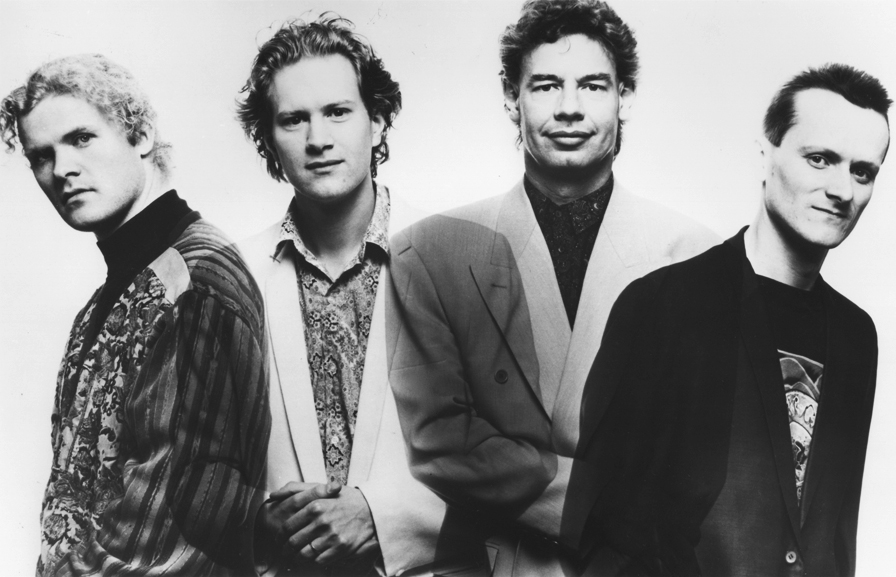 Earthworks: Iain Ballamy, Django Bates, Bill Bruford, and Tim Harries | Photo: VirginWhen drummer Bill Bruford formed Earthworks in 1986, the goal was to create fusion free of clichés. To that end, he recruited two of Britain’s finest up-and-coming jazz musicians and composers: multi-instrumentalist Django Bates and saxophonist Iain Ballamy.
Earthworks: Iain Ballamy, Django Bates, Bill Bruford, and Tim Harries | Photo: VirginWhen drummer Bill Bruford formed Earthworks in 1986, the goal was to create fusion free of clichés. To that end, he recruited two of Britain’s finest up-and-coming jazz musicians and composers: multi-instrumentalist Django Bates and saxophonist Iain Ballamy.
Mission accomplished. The group successfully forged a unique hybrid of jazz, rock, worldbeat and folk traditions. It’s a modern sound, yet one firmly rooted in its collective influences. One of the keys to that sound is Bruford’s custom drumkit that combines electronics and acoustic elements. At any given moment, he can be found playing sampled instruments and exploring chordal realms rarely the domain of drummers. The full effect can be heard on the group’s impressive third album All Heaven Broke Loose.
In conversation, Bruford is as fascinating and eloquent as his music. Innerviews spoke to him prior to an Earthworks gig in Ottawa, Canada. Topics include the band's current activities, as well as his prog-rock past with acts such as Yes and King Crimson.
How has Earthworks evolved over three albums?
Well, I suppose when I first thought about it, you know, electronic drums and stuff, I imagined maybe the band would be more harder and more processed—perhaps more aggressive. In fact, we've opted for a lighter, gentle, more airy sound—not dense, quite user-friendly. It’s quite rapid and light. That's the way the band developed organically. It's better to go with the flow than to superimpose an artificial kind of plan which would force people into things. So, we've opted for warm horns with drum patches burbling underneath and the bass underpinning that.
Does improvisation provide the basis for Earthworks pieces?
Not really. We don't actually play a whole lot. We don't have a big room we're always playing in. Rehearsals are something. It's complicated to get together. You have to pay for rehearsal rooms. You have to call the musicians in. Usually, we only rehearse something when something's pretty much written. Typically, a lot of tunes have started off my drumset—a complicated thing which plays half chords, half drums and allows me to access piano parts. So, I will configure something that sounds quasi-melodic and harmonically and rhythmically interesting. Look at "Pigalle" for example. It sounds slightly North African, slightly Moroccan to start with, and you get a feel for that. The next thing you know, the keyboard is on a harmonium, squeezebox type of patch, and then you're thinking of France and North Africa and Pigalle—the red light area of Paris where a lot of North Africans and Moroccans are and you look for a melody which is going to be a sinewy, snaky, slightly Arabesque melody and away you go, you have a tune called "Pigalle." So, we think quite cinematically and graphically. A lot of the pieces originate from this unusual drumkit which is the heart of Earthworks really.
Given all that you have available to you at the drumkit, why do you rarely solo?
Well, I'm not really a flashy drum soloist. To me, music is a cooperative sport. You do something and I'll do something with you and together we make music. That's what's always excited me. It's a social, cooperative endeavor—two or three people or more playing at the same time. Yes, there are solos of course occasionally. Once in a while, I burst into activity and on our upcoming live CD there's a long-ish solo which I really like a lot.
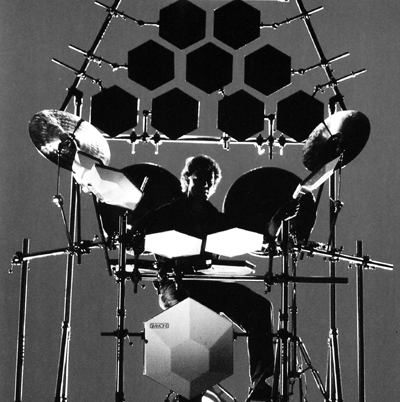 Photo: Bill Bruford Productions
Photo: Bill Bruford Productions
In general, electronic percussion is often misunderstood. Some confuse it with what’s created by a drum machine.
Yeah, that’s true. In a nutshell, a drum machine is a machine. You press a button and the Michael Jackson or Madonna show starts. The basic beats are all sequenced. And in those shows, the drummer will just play the cymbals and the loose stuff that doesn't matter in that context. What I do is quite different. Yes, I have an electronic drumset, and I have a computer onstage, but the computer is merely offering me a ton of sound at any one particular time. It stores all this sound and I can recall it very quickly. So, at an Earthworks concert you'll hear—one way or another—upwards of 40-50 percussion instruments. So, the instrument allows me to access a million instruments which can be assigned to pads. These pads can also have access to a keyboard and trigger all kinds of chords and melodic figures. So, it's just a big percussion and keyboard thing. But the main point is that I play it. It's flesh and blood. It’s in real time. It's not in a box that you press a button on. That's the big difference. It's a living, breathing instrument like electric guitar.
Do you foresee further work in the acoustic vein in the future?
Possibly. I've gone down this electronic road quite a bit since 1979 when I first started getting fascinated with the whole idea of melody in drums—rhythmically melodic figures and things keyboard players wouldn't do. And I've had some success with that and through some of the King Crimson material—"Waiting Man" and things like that. In the mid-'80s, the machinery involved that I needed was so poor. So, I had a couple of years off and decided to wait until it got a bit better. During that time, I formed an acoustic improvising duo with Patrick Moraz, an ex-Yes member who’s a pianist. We used just piano and acoustic drums. By about ‘86 or '87, the equipment had got much better and it was possible to return to electronic drums and have it configured the way I just described—with chords and all that stuff and a million different digital samples which is just amazing. So, I thought I'd have that as the basis for a group and headhunt some of Britain's best young jazz talent and say "Look, I'm going to do this kind of thrumming, strumming, drumming, blumming, thrumming thing on the drums here and whatever happens, you guys will sound different because the backdrop behind you will be different." And that amused both Iain and Django and here we are.
Describe your philosophy as a bandleader.
Music is to do with relationships between people and getting the right mix of people. That's the art of the bandleader I think—to not necessarily find the leaders of the day on their instrument, but to find talent that can be molded into the leaders of the day. So, I'm asking people who join Earthworks to do the things they probably wouldn't do in any other groups they're in—to take advantage of Earthworks as a springboard for their wildest fantasies and dreams, and to get specific and develop a specific vocabulary for the band which will eventually make the band unique. It takes awhile. It's a slow process. You don't force it, but eventually they'll find out they're playing in Earthworks with a pair of ears they don't really use in any other gig and they'll be able to view it as a place to develop and grow. And when they leave the band—if they leave the band—they will be different people to how they were when they first went into it.
Is "Splashing Out" a parody of dance music?
Perhaps a sideways glance. It starts like that, but then it rapidly implodes into a Cecil Taylor kind of rave-up between piano and drums in the middle, and then out of that debris it kind of reassembles itself. So, it disassembles itself and reassembles itself. It goes into a black hole in the middle which you can take as a comment on dance music if you like or not if you like. It's very prevalent, dance music. I feel jazz players should take on all forms of music of the day. I think jazz has always been a great big stew—a great big mess of things. I think jazz musicians are commentating all the time on current popular forms. Jazz always used popular forms, today it's hip hop and dance. So, instead of now where you might have Miles Davis tracks played with hip hop kind of rhythm machines and things, we thought we'd do one and have it as I say, explode in the middle and reassemble later. Hence, "Splashing Out."
David Torn served as co-producer of All Heaven Broke Loose. Describe his influence on the band's sound.
David does a number of things. First of all, he makes you laugh. Second, he knew the German recording engineer. Thirdly, he has the musicians' trust, so he's able to pick takes. On the All Heaven Broke Loose album, what you hear is four guys playing at once, doing three or four takes and you pick one. It's basically that kind of album. Sonically, David is very good with looping devices, echo and reverb. An example is "Temple Of The Winds" on All Heaven Broke Loose—a trio track. Django Bates was unable to come to the studio that day. He had to be in the south of France to receive an award, which he is always doing as England's best young jazz composer of the year. [laughs] It's tough being in a band with the best jazz composer of the year. He writes very well. So, we were left with a trio that day in the studio and we laid down a bed of looped tenor saxophone parts instead of keyboard playing which gave Iain Ballamy a springboard to improvise off and that's where David comes in very handy in terms of the sound on the album.
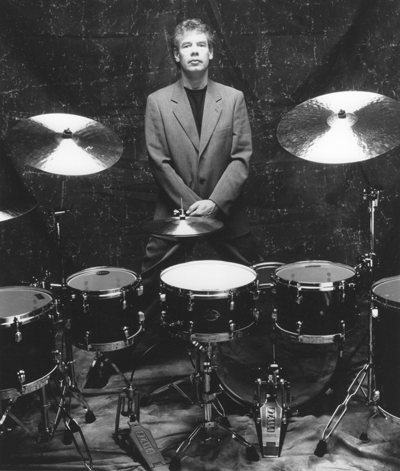 Photo: Bill Bruford Productions
Photo: Bill Bruford Productions
Compare what you do with Earthworks to what you did with Bruford. [the band]
[laughs] I don't know. I'm kind of a pragmatic guy you know. I do whatever comes up at the time. Looking back on it, I just kind of thought it was rock with lyrics. The term fusion wasn't around much back then. I thought we were a rock band with interesting meters. It was an interesting sound and I had a clanging roto-tom type drumkit at the time and a genius of a soloist named Allan Holdsworth who's one of my favorite guitar players. I thought the band was very nice. I think the issue of whether it was rock or jazz never bothered me my whole career. Ever since I started with Yes, it was always "Well, is it rock?" And now with Earthworks it's "Well, is it jazz?" You know, the musicians never care and they really don't know either. Yes, of course Earthworks is jazz because large portions are improvised. The spirit of the music is from jazz, but it has rock elements in it and elements of other music as well.
A few years ago, you said America's jazz scene was in an awful state of confusion. How do you perceive it now?
It's not really in confusion now, it's lost! [laughs] There's a lot of ambivalence around and a lot of confusion. There's some tremendous jazz talent, legitimate, avant garde and electronic. On the whole, the record companies have decided the people don't need to hear it. So, you'll hear instead heavy metal and hard rock and that's just the environment that people like me work in right now. We had all the audiences' ears through the ‘70s and ‘80s which is fine. I'm quite sure in10 years time we'll have the audiences ears again. These things are cyclical. If you go to the Montreal Jazz Festival tomorrow night, you're going to hear some tremendous music—a lot of European musicians and a lot of great French Canadian musicians. But you're never going to hear them on the radio. But that has ever been the way in jazz hasn't it? Jazz is a relationship between the musician and the audience. It's not between the musician and the record company as it is in rock. In rock, the record company has successfully interplaced itself between the player and the audience. And it's the record company which now says you cannot do this and you cannot do that. And I know of what I speak, because I'm also in a big rock group called Yes which has all these problems and more—twice as badly as I could ever describe to you.
Jazz as a concept seems subject to the whim of marketing men too. As you’re aware, they’ve managed to create a new genre called ‘smooth jazz’ which is little more than instrumental top-40 music.
It's a bit of a problem really, because North America has much more interesting stuff than that. It's bubbling there, but it's very repressed. So, America is very split between guys who are still alive and wanna play the stuff and an unhappy audience who doesn't really know the stuff exists. This of course all stems from the patronizing of the audience by businessmen. It's in their interests to ensure that they treat you like children and that you're given only lollipops and McDonald's. Nothing wrong with lollipops, ice cream and McDonald's once in awhile—I like that too, but as a whole diet? I think the food analogy is quite good. Once in a while, you want to eat something that's real, that was grown in the earth and that's what jazz is.
I don't want this to turn into a completely negative kind of scene. I am aware that I am working in a commercial world and any musician will tell you that after seven or 10 good years there's going to be 10 years of drought. Then the thing will turn around again and things will pick up. I've been fortunate to have been in a very creative period—the early '80s. They were quite creative on a fairly mass scale—look at King Crimson, Peter Gabriel, Laurie Anderson and Talking Heads. All of those bands had albums that were selling 300,000 to 400,000 copies and close to the American top-40. That was a great period to be around. Since then, it's died down a lot, but I know it will come back.
What do you perceive as the differences between the current American and British jazz philosophies?
If you say British jazz to almost anyone in North America, they'll say "Cleo Laine and John Dankworth." They don't know that Britain has any jazz and they're generally unaware that Europe has any jazz either. Now, if you go around to European jazz places and festivals, you'll be well aware that there is in Europe still very much a strong cutting edge in jazz you're not hearing on North American radio. So, in a way the Europeans are a lot freer to play what they want to play than the Americans are. The Americans have this sort of Wynton Marsalis-retro-jazz-in-a-museum, jazz-in-a-suit-and-tie kind of thing. The British are one of these nations that since we don't have any jazz tradition or rhythmic culture of our own, we do what we like with the stuff.
My whole function is as a question mark. "Is it jazz?" Dig? "Can you have electronic drums in jazz?" Maybe you can, maybe you can't, but that's what Earthworks is for. "Isn't it slightly weird having upright bass with an electronic kick-drum?" Yes, maybe it is, maybe it isn't, but that's what Earthworks is for. It's to try to ask questions, not answer them. "Can British people swing?" Ask Django Bates, he'll swing your pants off! "Can they improvise?" Of course they can! "What can British people bring to jazz?" Well, they can bring a kind of wit and intelligence to it. They can bring their folksy tradition through things like "Up North" which is a reference to the Northern brass bands. So, you're looking to your European musicians to tap upon their folk roots and use the basis of jazz, which is now an international sport, to exercise their wit and intelligence.
I think Americans in particular would do well to acknowledge that there are some interesting things coming from there. Jazz is secure. It's not a threat. Americans are behaving like European jazz is a threat, which is a sure sign of compliment. [laughs] Canada is different. It's no accident that we've been to Canadian jazz festivals. We've been playing the Edmonton and Saskatoon jazz festivals. A couple of years back we did Vancouver and Victoria. We're here for the Montreal Jazz Festival and so forth. The Canadians have a much broader, more European-style attitude to this. They find the jazz from California very insipid, as do the British from our area. So, between Europe and Canada, we're in a stream there. But so far, America is fairly difficult for us because it's so mellow.
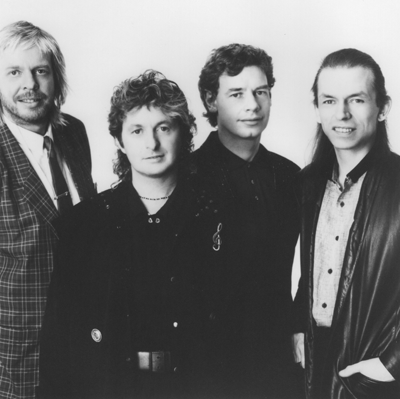 Anderson Bruford Wakeman Howe, 1989 | Photo: Arista
Anderson Bruford Wakeman Howe, 1989 | Photo: Arista
I was surprised when you joined Anderson Bruford Wakeman Howe, which soon after morphed into Yes. What was your motivation?
Well, usually you bother for financial reasons. You get paid tons there—much too much, and it's great. And the reason it's great is because the money allows you to do all sorts of things, like supplying Django Bates with a fuzzbox or selecting radio mics for Earthworks or buying rehearsal and studio time. Musicians often nowadays, when the shit hits the fan, to use a proverbial colloquialism, are going to be working in two spheres. To survive, you're going to have to work in a couple of places. If you're not working in studio music, you're working in movie music or jingles and then jazz is what you do with that money and that's very much my case. There's no doubt that Anderson Bruford Wakeman Howe and Yes have turned into a financial bonanza for me, which is absolutely great. There's no musical future in it from my point of view—it's regressive music, it’s historical stuff. But once in a while, I think a musician is allowed to go on vacation and make everyone very happy by playing all the stuff they all want them to play from 20 years ago. But it's nothing that I would give up my day job for, which I know very well is to play music that you don't know that you want yet, but you will want it in 10 years time. [laughs] I know it because it's happened to me at least three times—nobody wanted Yes when I was in Yes.
How do you look back at the Yes Union album and tour?
It was totally out of the hands of the musicians involved. It was put together by political people from record companies—people who stand to make more money than the musicians do. They'll put together a scenario and say "Hey, let's go on tour for four months, make an album, bumpity bum bum bum. We, namely the politicians, will make a little bit more money than you will, but you will be able to make money and pay off all those debts you've got yourself into." On the whole, this is what happens in rock. Most musicians operate from a loss-making position and they incur so much debt that they have to go on tour to pay off the debt. I exclude myself from this. Myself, I'm different. I don't have to go on tour to do that kind of stuff. I could simply take the money, make a lot of money and use it on other things that I want to do. There's a parallel that you could use with an actor like Sean Connery. You know, he'll do some abysmal Hollywood movie with a cast of thousands and he's not on the whole asked his opinion and is told what to do and then he'll go back to the Royal Shakespeare Company in England or something and get paid nothing and do what he wants to do. It's very common throughout the arts.
I think the unhappy thing about this of course is the imbalance. I could throw a party in my house with a dozen of my most intimate musical acquaintances. I would divide the room into two halves. Six people on one side of the room would not be millionaires, they would be multi-millionaires who own large portions of real estate and so forth. The other half would be six so-called jazz players who have so little money they're practically begging on the street. It is unnecessary to have such a stupid financial division amongst these different types of music, but it is necessarily what will happen if accountants and stockholders run the recording industry. That is how it works—the stockholder must see a fast return on his investment.
You didn’t look like you were having much fun at the Yes Union gig I saw.
Yeah, I was extremely underemployed. What can I tell you? It was eight musicians all playing the same. There's no need for eight people. So, if the music requires just a little bit of icing on the cake from me, then that's what it gets. There's nothing else I can do. If Alan [White] is going to do what Alan does, which is very fine and well and good, [sarcastically] there's no need for two of us really. So, I adopted the role of an electronic percussion player.
What is the current status of Yes?
Ah, well, I don't know. I have no idea what the current line-up is. [laughs] And anyway, if you asked me today, it'd be different tomorrow. You see a band like that when you see it. Nobody knows. Presumably it's what Chris Squire, Trevor Rabin, Steve Howe and Jon Anderson can agree on. I don't think the keyboard players and the drummers have anything to do with it. You can probably forget Kaye, Wakeman, Bruford, White. They'll just turn up if you want them. The guys who write the tunes have to decide what they want. I know Yes has been dropped by Arista, leaving Arista out of pocket millions of dollars and we'll probably go to Victory I suppose, which I don't think is gonna be any great success.
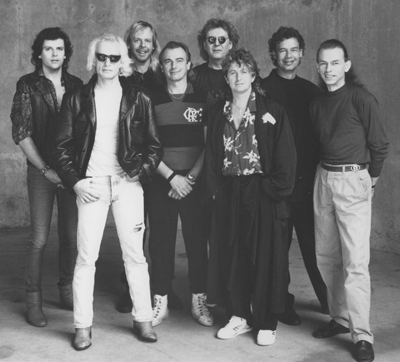 Yes, Union Lineup, 1991 | Photo: Arista
Yes, Union Lineup, 1991 | Photo: Arista
Why has your relationship with Chris Squire been so steeped in acrimony?
He represents pretty much everything I don't represent in music. He's a difficult guy. He's slow, pedantic, very politically-orientated, he doesn't generate that much music and he certainly doesn't generate it easily. It's all a long, drawn-out, slow process. So, he's not my favorite musician to work with. But, I can work with anybody—if I have to. [laughs] Not my bass player of choice.
Does the Anderson Bruford Wakeman Howe experience hold fonder memories?
For about two or three months it seemed as if Anderson Bruford Wakeman Howe really had a group in the making. It seemed as though we would establish a body of work and eventually evolve away from the Yes material. However, the politicians got involved and that idea was quickly crushed.
How do you feel about King Crimson reforming without you?
Well, I don't know that it's reforming. I wouldn't hold your breath on that. King Crimson is the kind of thing that never dies. The reason it never dies is because it's a very good marketing idea. If the group breaks up, the records are removed from the record shop. So, the first rule of any musician's life is that you never break up and you never stop doing anything.
Adrian Belew said it’s very likely to go ahead without your involvement.
Okay, well that's fine. Thanks Adrian. And the reason I'm not involved is because of course, I'm a little difficult for Robert Fripp. Robert is better with sweet, smiling Americans, who don't really know what he's talking about. [laughs] Unfortunately, I know exactly what he's talking about and I'm not invited.
Most of your groups seem to record on a four-year cycle before breaking up. Earthworks has already outlasted that.
There tends to be a natural life cycle. Three albums take four or five years. It may well be that whatever four or five people have come together to do is done in three, four or five years. Things change and that's part of the point of music. It's good that we don't all get stuck. It's good that we're not all the Beach Boys hammering away, doing the same things they were doing 25 years ago. You pay me to go forward. I think that's the general idea. You look to me for interesting things on the drums. And if I can't do interesting things on the drums in a situation like Genesis or Yes, then inevitably I move to the lower scale where I can do what you want.
Listen to the audio podcast version of the interview: